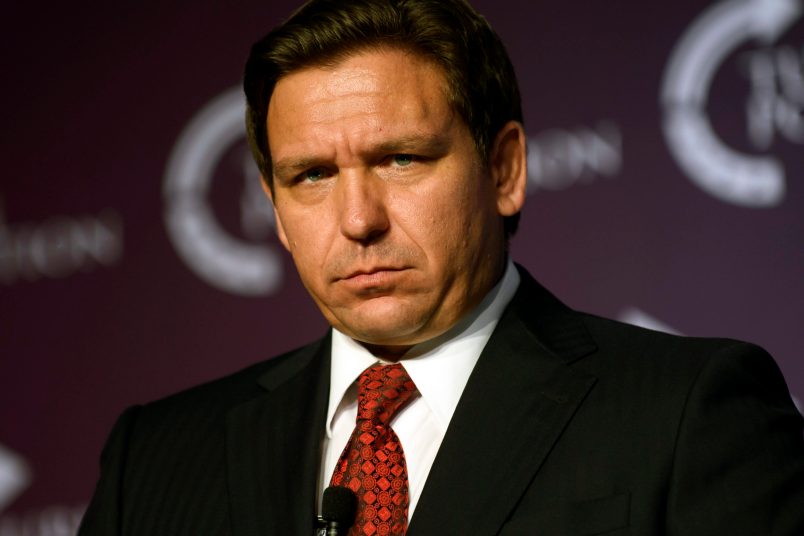One of the cases brought by Florida Gov. Ron DeSantis’ stunt election crimes task force actually managed to make it to trial this week – and it ended in a split verdict and partial acquittal.
Nathan Hart, 49, was arrested alongside nearly two dozen other returning citizens late last summer for alleged voter fraud as part of DeSantis’ broader made-for-TV efforts to make illegal voting look like a widespread problem in Florida. Hart, who had a felony conviction for lewd or lascivious molestation, told jurors that he thought that he’d regained the right to participate after voters reinstated formerly incarcerated Floridians’ right to vote in the state back in 2018.
According to his testimony, Hart was approached by a man outside of a Hillsborough County driver’s license office in 2020, who told him that the amendment restored the right to suffrage for returning citizens so long as they had completed their sentence.
The man also told him that the worst thing that could happen was that he was unqualified, Hart added.
But two years later, Hart was rounded up in a series of highly publicized arrests as part of Gov. Ron DeSantis’s new initiative: the Office of Election Crimes and Security, a police unit within the Florida Department of State tasked with rooting out voter fraud. It was launched last August as the Big Lie still lingered following efforts to overturn the 2020 election.
So far, the task force has only gone after a handful of formerly incarcerated residents — mostly Black, mostly in South Florida — who’d been accused of voting illegally. Three of the cases have been dismissed on a technicality, while one was settled through a plea deal before going to trial.
In Hart’s case, statewide prosecutors charged him with two third-degree felonies: false affirmation in connection with an election and illegal voting. However, prosecutors had trouble proving Hart’s intent in trial.
Hart’s attorney, assistant public defender Joseph Kudia, told the jury that Florida law says that voting illegally has to be a “willful” violation, meaning that he’d have to have known that he wasn’t eligible in the first place.
“You need to pay attention to whether or not the state proves this is knowing, this is intentional,” he told jurors.
Hart said on the stand that he checked the box on his registration form saying that he was eligible based on what the Hillsborough County man had told him. Hillsborough County Elections Supervisor Peg Reese testified that the state doesn’t complete background checks on voter registration forms.
But it is the state’s responsibility to verify voter eligibility and instruct county supervisors on who to remove from the rolls, according to Florida law.
“The Florida Department of State has a duty under section 98.075(5), Fla. Stat. to identify those registered voters who have been convicted of a felony and whose voting rights have not been restored,” former Florida Secretary of State Laurel Lee told the Tampa Bay Times and ProPublica. “The law requires the department to review information from a number of sources and make an initial determination as to whether the information is credible and reliable.”
Kudia closed his argument by emphasizing that fact. “If the county has failed, and if the state failed, the only entity we can go to is you,” he told the jury. “We’re asking you not to fail Mr. Hart.”
State prosecutors, however, opted to bypass this point by pointing out that Hart had signed an oath swearing that what he wrote in his registration form was true.
The jury convicted Hart on Tuesday for false affirmation, but acquitted him for voting as an unqualified elector. His sentencing date is set for Feb. 27.
Last week, a judge offered him a plea deal so he could receive no punishment beyond the time he’d already served in jail, but Hart turned it down.
“I don’t think that I willingly did, or knowingly did, anything wrong,” he said.







For the umpteenth time, that wasn’t the goal, it was the cover. The goal was to discourage certain demographics, “those” people, from voting. Vote and risk getting put through the criminal legal system. Even if you emerge vindicated, you still have lost weeks or months of your life and 1000s of dollars. Judging by the 2022 FL election results, mission accomplished.
Ron DeSantis is an evil pig working to become a Florida, and God forbid, a U.S. dictator. He is fully deserving of the name, Ron DeSatan.
1965 Version:
2023 Version:
Looks like DeSantis could use some fiber in his diet.
I believe that’s bog standard Republican constipated look.